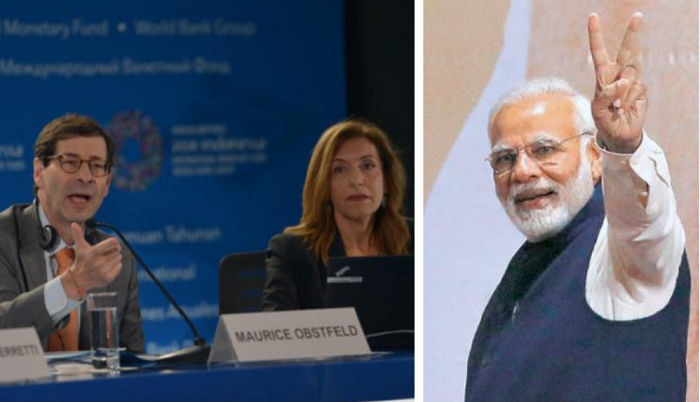IMF chief economist cheers the Indian economic growth under Modi Government in past 4 years
Total Views |

Washington, December 10: "India under the government of Prime Minister Narendra Modi has carried out some really fundamental reforms. These include the Goods and Services Tax (GST), the Insolvency and Bankruptcy Code...A lot of what they have done on financial inclusion has been really important," said the International Monetary Fund’s chief Maurice Obstfeld in Washington during a conference.
The IMF official Maurice Obstfeld said that India’s growth rate has been very solid over the past four years. The official further said that the government under Prime Minister Narendra Modi has carried out some really fundamental reforms. He further added that a lot has been done on the financial inclusion which turns out significant.
"There are important vulnerabilities, so it is important for the reform momentum to be maintained even as an election comes up and for the path of fiscal adjustment to be maintained," Mr Obstfeld added.
Obstfeld said there has been a long legacy of corporate debt associated with bad infrastructure projects in the country, adding that such loans have been very concentrated in the banking system.
"But as the government is trying to better oversee the banking system, these loans have migrated to shadow banking and that is an area where more needs to be done to contain financial pressures, which we are beginning to see in India," he said.
Citing the upcoming general elections in India next year, he said that the government is putting up it’s best effort to keep up the growth momentum but added that each step should be equated as financial vulnerabilities can go south very quickly.
Maurice Obstfeld aged 66, who is set to retire this month end, will be succeeded by Gita Gopinath, the second Indian to be appointed to the position. Former RBI Governor Raghuram Rajan had served as Chief Economist of the International Monetary Fund.
The International Monetary Fund (IMF) is an organization of 189 countries, working to foster global monetary cooperation, secure financial stability, facilitate international trade, promote high employment and sustainable economic growth, and reduce poverty around the world. The IMF's primary purpose is to ensure the stability of the international monetary system, the system of exchange rates and international payments that enables countries to transact with each other.